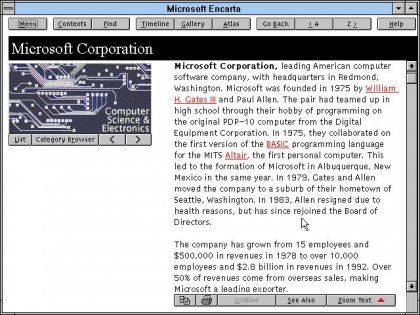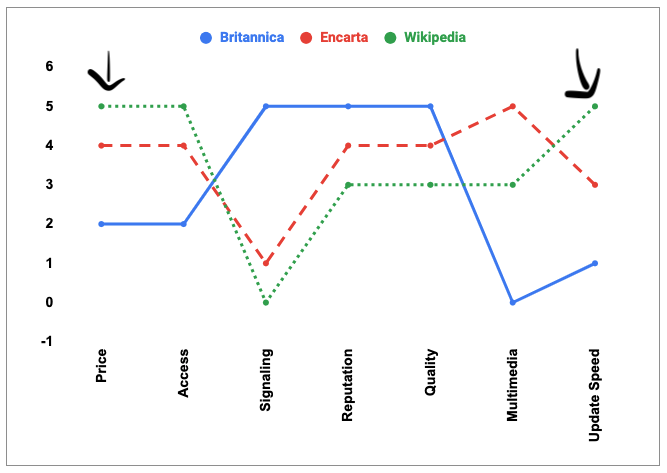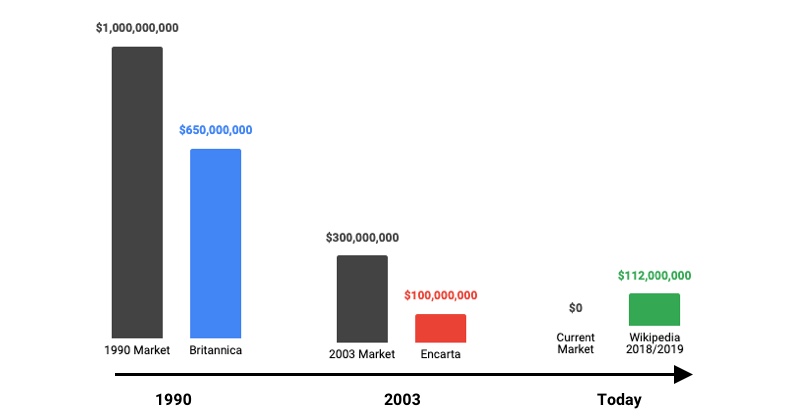In 1990, Encyclopaedia Britannica sold 117,000 book sets and generated $650 million in revenue. By 1996 that number had fallen to less than 3,000.
(Thread ↓)
(Thread ↓)
The first Encyclopaedia Britannica was published 250 years ago but the company saw the opportunity in the 80s to go after the "homes" market.
They built a door-to-door salesforce and found traction IMMEDIATELY. By 1990 they had 7,500 salesmen $600m in revenue.
They built a door-to-door salesforce and found traction IMMEDIATELY. By 1990 they had 7,500 salesmen $600m in revenue.
The value prop for Britannica was two-fold:
① alleviating parents’ guilt around their children& #39;s education ② signaling "I care about my kids and have enough money to spend $2,000 on a set of books"
The in-house selling experience maximized both. https://twitter.com/lehrjulian/status/1243951658628980736?s=20">https://twitter.com/lehrjulia...
① alleviating parents’ guilt around their children& #39;s education ② signaling "I care about my kids and have enough money to spend $2,000 on a set of books"
The in-house selling experience maximized both. https://twitter.com/lehrjulian/status/1243951658628980736?s=20">https://twitter.com/lehrjulia...
But while Britannica execs where shopping for a car that said "I& #39;m an intellectual with money" something in Seattle was brewing: Bill Gates wanted an encyclopedia.
Microsoft tried to license Britannica but management refused. They were confident on their grip of the market.
Microsoft tried to license Britannica but management refused. They were confident on their grip of the market.
They finally found a licensor in Funk & Wagnalls and in 1993 unveiled Encarta as a CD-ROM encyclopedia for $395.
Encarta and Britannica competed on:
• Price
• Accessibility
• Signaling
• Reputation of Content
• Quality of Content
• Multimedia
• Updating Speed
The accessibility, multimedia content and the ability to link articles attracted some customers but the response was meh.
• Price
• Accessibility
• Signaling
• Reputation of Content
• Quality of Content
• Multimedia
• Updating Speed
The accessibility, multimedia content and the ability to link articles attracted some customers but the response was meh.
It wasn& #39;t enough. Then Microsoft lowered the price and all hell broke loose.
The $99 Encarta was a smashing success: it quickly sold 350,000 units, making it the best-selling CD-ROM encyclopedia by the end of 1993. Its sales passed a million units the next year.
The $99 Encarta was a smashing success: it quickly sold 350,000 units, making it the best-selling CD-ROM encyclopedia by the end of 1993. Its sales passed a million units the next year.
Britannica saw the threat but it was too little too late.
They developed an $800 CD-ROM but it was text only because the Britannica content was too large to fit on a single CD.
Meanwhile, Microsoft bundled Encarta with computers, positioning them as a "work and study" tool.
They developed an $800 CD-ROM but it was text only because the Britannica content was too large to fit on a single CD.
Meanwhile, Microsoft bundled Encarta with computers, positioning them as a "work and study" tool.
Britannica sales started dropping:
110,000 in 1990
↓↓↓
51,000 in 1994
↓↓↓
3,000 in 1996
By 1996, Encarta controlled 44% of the market and, facing financial pressure, Britannica was sold for $135m, a fraction of its book value.
110,000 in 1990
↓↓↓
51,000 in 1994
↓↓↓
3,000 in 1996
By 1996, Encarta controlled 44% of the market and, facing financial pressure, Britannica was sold for $135m, a fraction of its book value.
But there& #39;s more to the story.
In 2001, Wikipedia was launched. After a mention on Slashdot in July, the flywheel started spinning.
↱ More articles ↴
More writers More backlinks
⬑ More search traffic ↲
In 2001, Wikipedia was launched. After a mention on Slashdot in July, the flywheel started spinning.
↱ More articles ↴
More writers More backlinks
⬑ More search traffic ↲
From being laughed out of the room for trying to create an "open source encyclopedia" to insane growth:
Feb: 1,000 articles.
Sept: 10,000 articles.
Dec: 20,000 articles.
Aug 2020: 40,000 articles.
Feb: 1,000 articles.
Sept: 10,000 articles.
Dec: 20,000 articles.
Aug 2020: 40,000 articles.
Thanks to the power of the internet, Wikipedia was competing vs. Encarta along completely different dimensions:
• Accessibility →Everywhere
• Price → Free
• Speed of updates → Immediate
Cute drawings and reputation were irrelevant.
• Accessibility →Everywhere
• Price → Free
• Speed of updates → Immediate
Cute drawings and reputation were irrelevant.
Microsoft realized that and dropped the price to $22.95 but it didn& #39;t help much.
Wikipedia attacked Encarta from an angle where Microsoft couldn& #39;t defend.
In 2009, Microsoft decided to shut down the Encarta division.
Wikipedia attacked Encarta from an angle where Microsoft couldn& #39;t defend.
In 2009, Microsoft decided to shut down the Encarta division.
This story is a lessons on disrupting incumbents and the power of the internet but here& #39;s my favorite:
Shrinking a market by disrupting pricing models is a powerful value creation opportunity (if you can pull it off).
$1b (Britannica) → $100m (Encarta) → $0 (Wikipedia)
Shrinking a market by disrupting pricing models is a powerful value creation opportunity (if you can pull it off).
$1b (Britannica) → $100m (Encarta) → $0 (Wikipedia)
If you want more content like this subscribe to Seedtable – my newsletter on European technology.
It combines stories and strategic analysis to help you understand what& #39;s going on in European tech. http://seedtable.com/ ">https://seedtable.com/">...
It combines stories and strategic analysis to help you understand what& #39;s going on in European tech. http://seedtable.com/ ">https://seedtable.com/">...

 Read on Twitter
Read on Twitter




